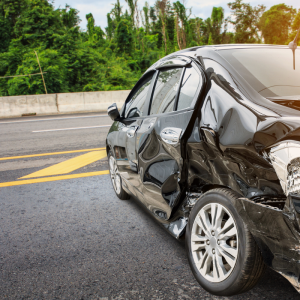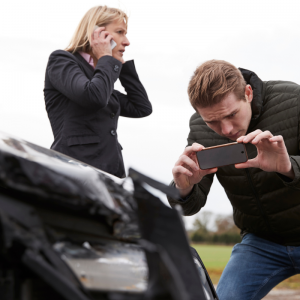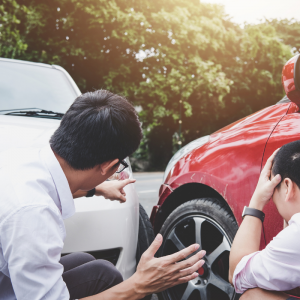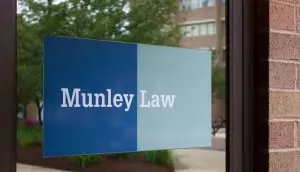Parties Who Determine Fault in Car Accident

If you’ve been injured in a car accident, one of the first things you might think is “That was not my fault!” Once the immediate stress of the accident wears off you might start wondering, “But how do I prove that? Can I prove that? Who actually determines the fault in a car accident?” Fault is not necessarily decided by one party. Rather, the police report, your insurance company, and sometimes the other driver play a role in determining fault in car accidents.
In order to recover compensation for damages in an auto accident, you should consult an experienced car accident lawyer. The team at Munley Law Personal Injury Attorneys has decades of experience helping the victims of car accidents and we’re here to offer a free consultation and free case review today. If you or a loved one has been involved in an accident, before you speak with the insurance companies, you might want to talk to an attorney. At Munley Law Personal Injury Attorneys, the consultation is always free. Call us today at 844-969-724 to find out what your rights are following a car accident.
Do Police Assign Fault in an Accident?
The first pass at determining fault in an accident comes from the police who respond to the scene. An officer’s primary duty when arriving at the scene of a motor vehicle accident is to assess whether anyone needs medical care.
Their secondary duty is to examine the scene, collect evidence, and determine what happened, why, and who is responsible.
Sometimes it’s clear for the person or party who determines fault in an auto accident. For instance, if you were hit by a drunk driver, or someone clearly ran through a red light and crashed into another vehicle or vehicles, the fault is obvious. Other times it’s more ambiguous.
What will be in a car accident police report?
The report usually consists of their review of the accident scene and the property damage, physical evidence, and more. The officer will also interview all parties involved, including you, the other driver, and witnesses. In a typical car accident report, you will find the following information:
- Information on the vehicle collision, including the parties, vehicles, vehicle damage, and property involved
- Addresses, phone numbers, and insurance details of the persons involved and other identifying information.
- Information on how to identify witnesses
- Approximate time, date, and location of the occurrence
- The scene’s climate, terrain, and visibility conditions
- Driver, passenger, and witness statements
- Photographic evidence or graphic of the collision, including damage and any other evidence of speed or direction such as skid marks
- Location
- The cars’ route(s)
- Point of contact
- Descriptions of the bodily injury done to the people, cars, or both
- Citations or violations of the law, if any
- Other information about how or why the accident happened, such as the officer’s assessment of what caused the collision and/or a finding of fault
Your insurance company will want to understand all these details when they review your case.
Do Insurance Companies Determine Fault?
If the other driver denies responsibility, the insurance company determines fault for the accident. In the aftermath of a car wreck, an insurance adjuster or investigator from the insurance company will weigh all relevant data, relying heavily on the police report along with other evidence.
This is why it’s always important to call the police immediately after an accident. Their report will serve as the official account of what occurred and will be used as a tool (though not the only one) to correctly assign fault by your own insurance company.
This is also why it’s very important to gather your own physical evidence after the accident. You can take pictures of the scene, the vehicles involved, and your injuries, should you have sustained any. You are also free to ask witnesses for their accounts, and whether they’d be willing to share their information with you for possible further contact. All of this can help to paint a full picture of what occurred and make sure the right driver is held responsible.
What do I do immediately following a crash?
If you are in an accident with other drivers involved:
- First thing is to always seek medical attention for yourself and any passengers in the vehicle. Even minor injuries with little pain may become worse as the time progresses and the adrenaline following the crash starts to wear off.
- Contact the police at the scene of the crash and make sure the responding officers file an accident report. This report will be crucial to your case if you need to take legal action in the future. Report the events as you saw them as calmly as possible to the responding officers. Do not attempt to place blame, and never admit to even partial fault for the accident. Determining fault may not happen yet at this stage but all of the information gathered during this step will be added to the record of the accident and may come into play later.
- Take down the names and badge numbers of any officers who reported to the scene
- Exchange car insurance information and contact information with the other driver.
- If possible, take photos of the scene and of the damage to your vehicle.
- Immediately following the crash, you will be contacted by your insurance company and the insurance company for other party involved.
Make no statements regarding the facts of the crash to the insurance companies. Car insurance companies are in business to make a profit.
Even if the at fault driver admits they are responsible for the accident, the car insurance company will try to convince you to accept a small settlement or try to get you to admit fault. Do not speak with the insurance companies for any of the drivers involved until you speak with your lawyer.
- Contact a car accident lawyer as soon as possible. Even if you are still in the process of getting medical treatment and waiting to hear from the insurance companies on determining fault, an experienced car accident lawyer can help you through this challenging time and help you through the next steps.
How to obtain a copy of your accident report
You are entitled to receive a copy of your crash report. According to Pennsylvania State Police website, “persons authorized by Section 3751(b) of the Pennsylvania Vehicle Code include any person involved in the crash, their attorney, insurer, the Federal Government, Branches of the Military Service, Commonwealth Agencies, Officials of Political Subdivisions, or Agencies or other States and Nations and their political subdivisions.”
Crash reports are available for purchase online via the Pennsylvania State Police website. If you prefer to mail your request, there is also a printable form available.
What is the importance of determining car accident fault?
Deciding who is responsible for an accident is vital. It usually determines who will take responsibility financially for damages caused by an accident. Generally, the people liable for the injuries caused are those who have caused the accident. In most scenarios, the at fault driver is not personally financially liable for the losses; their insurance company will be. But this is not always the case. Determining fault is one of the biggest decisions made after a crash that can affect both drivers financially.
Comparative Negligence in Auto Accidents
 Once fault is determined, the insurance company adjusters will assign particular percentages of fault based on the specifics of a case. This is called “comparative negligence
Once fault is determined, the insurance company adjusters will assign particular percentages of fault based on the specifics of a case. This is called “comparative negligence
If one driver’s negligence is the sole cause of the accident, they will bear all the responsibility. But often, two or more drivers play a role in the accident. In a case like this, depending on what happened, insurance adjusters may determine that one driver is 60% responsible and the other driver is 40% responsible.
The “51% Rule”
In Pennsylvania, a system called modified comparative negligence is applied. It’s also known as the 51% rule. That means, if a driver holds more than 51% of the fault, they cannot collect damages against a party with 49% fault.
Do I need to hire a car accident attorney?
If you believe that the insurance investigators have incorrectly assigned fault, or incorrectly applied comparative negligence, you have every right to seek legal counsel and representation. The dedicated car accident attorneys at Munley Law Personal Injury Attorneys can review your case and help you pursue legal action if that is warranted.
Admitting fault in a car accident
An auto accident involving multiple vehicles with one or more drivers can be a very scary and high-adrenaline situation, especially if someone is hurt. But it’s important to remember not to admit fault after a car accident.
It’s often a human impulse to say sorry even when you’re not really the one in the wrong. In the case of a car accident, this can be a serious mistake, as simply apologizing can be perceived as an admission of fault. Avoid this kind of error and allow the police to make their determination in accident cases.
What if the Other Drive Does Not Have Insurance?
Although the state of Pennsylvania legally requires all drivers to be insured, there are unfortunately people who choose to break this law and drive without insurance. In a case where you have been in an accident with one or more drivers and the at-fault party does not have insurance, you have a couple of options.
You can file a compensation claim with your own insurance company with personal injury protection, or, alternately, you can file a personal injury suit against the negligent driver. The same is true if the at fault driver does not have sufficient coverage to meet your needs.
The specifics of this process and personal injury protection vary state to state. The attorneys at Munley Law Personal Injury Attorneys can help you determine which of these courses of action is best after thoroughly reviewing your case. Contact us today for a free initial consultation.
Arbitration Versus Trial
If insurers don’t agree on fault, arbitration is an option. The dispute can be taken to a private company, “Arbitrations Forums Inc.”, where a third party assesses the damage and decides who is responsible for what level of payment or compensation. This reduces the number of car accident cases that rise to the level of a lawsuit.
To understand more about the arbitration process after an auto accident, consult an attorney today for a free consultation.
Types of vehicle damage following a crash
In many cases, you can tell what type of accident a vehicle has been in based on the vehicle damages. For example:
- Head-on collisions: These type of crashes will damage the front bumpers/front ends of both vehicles.
- “T-Bone” or side-impact collisions: The at-fault vehicle should have damage to its front end/front bumper and the vehicle struck will be damaged on the side.
- Rear-end collisions: The car that hit you should have damage on the front end/front bumper. Your car should be damaged in the rear end/back bumper.
- Side-swipe collisions: Each of the two vehicles involved should have damage on the or along the entire one side of the vehicle.
How can vehicle damage help with determining fault?
Vehicle damage, including some of the examples above can both indicate and rule-out certain scenarios. By analyzing damage, police, insurance companies and lawyers can recreate an accident and assign fault. For example: If a driver claims they were stopped at a red light and the other vehicle struck them from the side, if the first driver’s vehicle has sustained damage only to its front end, and the second vehicle only to its side, we can likely determine that the driver was not being truthful.
Damage can help us determine direction, speed and fault.
Seek Legal Advice from Car Accident Lawyer
If you’ve been in an accident and want to know “Who will be responsible for determining the fault in my car accident?” Munley Law Personal Injury Attorneys is here to help. Call or message us today to talk to an attorney who can guide you through this complex process and make sure you receive all the compensation you are owed.
Contact us today for a free consultation or free case review.










